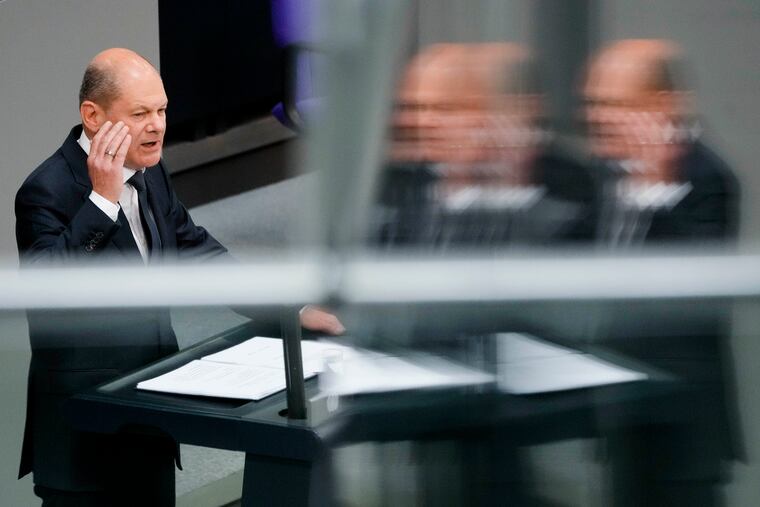US and Germany agree to supply advanced weapons to Ukraine
The U.S. planned to unveil a new weapons package later in the day that includes high-tech, medium-range rocket systems.

KYIV, Ukraine — The U.S. and Germany pledged on Wednesday to equip Ukraine with some of the advanced weapons it has long desired for shooting down aircraft and knocking out artillery, as Russian forces closed in on capturing a key city in the east.
Germany said it will supply Ukraine with up-to-date anti-aircraft missiles and radar systems, while the U.S. announced it will provide four sophisticated, medium-range rocket systems and ammunition.
The U.S. is trying to help Ukraine fend off the Russians without triggering a wider war in Europe. The Pentagon said it received assurances that Ukraine will not fire the new rockets into Russian territory.
The Kremlin accused the U.S. of “pouring fuel on the fire.”
Western arms have been critical to Ukraine’s success in stymieing Russia’s much larger and better-equipped military, thwarting its effort to storm the capital and forcing Moscow to shift its focus to the industrial Donbas region in the east.
» READ MORE: High prices, Asian markets could blunt EU ban on Russian oil
But as Russia bombards towns in its inching advance in the east, Ukrainian President Volodymyr Zelenskyy has repeatedly pleaded for more and better weapons and accused the West of moving too slowly.
Andriy Yermak, the head of the Ukrainian president’s office, hailed the new Western weapons.
“I’m sure that if we receive all the necessary weapons and strengthen the efficient sanctions regime we will win,” he said.
The new arms could help Ukraine set up and hold new lines of defense in the east by hitting back at Russian artillery pieces that have been battering towns and cities and by limiting Russian airstrikes, said retired French Gen. Dominique Trinquand, a former head of France’s military mission at the United Nations.
“The NATO countries — the European nations and the Americans — have progressively escalated the means that they are putting at Ukraine’s disposal, and this escalation, in my opinion, has had the aim of testing Russian limits,” he said. “Each time, they measure the Russian reaction, and since there is no reaction, they keep supplying increasingly effective and sophisticated weaponry.”
Military analysts say Russia is hoping to overrun the Donbas before any weapons that might turn the tide arrive. It will take at least three weeks to get the precision U.S. weapons and trained troops onto the battlefield, the Pentagon said. But Defense Undersecretary Colin Kahl said he believes they will arrive in time to make a difference in the fight.
The rocket systems are part of a new $700 million package of security assistance for Ukraine from the U.S. that also includes helicopters, Javelin anti-tank weapon systems, radars, tactical vehicles, spare parts and more.
The rockets have a range of about 50 miles (80 kilometers) and are highly mobile. Ukraine had pushed unsuccessfully for rockets with a range of up to 186 miles (300 kilometers).
Kremlin spokesman Dmitry Peskov said Moscow does not trust assurances that Ukraine will not fire on Russian territory. “We believe that the U.S. is deliberately and diligently pouring fuel on the fire,” he said.
Col. Gen. Mikhail Mizintzev later went even further, directly accusing Ukraine of planning to fire U.S.-provided missiles from the northeastern Sumy region at border areas in Russia. The claim, based on alleged radio intercepts, couldn’t be independently confirmed.
Russian Foreign Minister Sergey Lavrov said Ukraine’s push for more weapons is a “direct provocation intended to draw the West into the fighting.” He warned that the multiple rocket launchers would raise the risk of an expanded conflict.
“Sane Western politicians understand those risks well,” he said.
Germany’s promise of IRIS-T air defense systems would mark the first delivery of long-range air defense weapons to Ukraine since the start of the war. Earlier deliveries of portable, shoulder-fired air defense missiles have bolstered the Ukrainian military’s ability to take down helicopters and other low-flying aircraft but didn’t give it enough range to challenge Russia’s air superiority.
Germany has come under particular criticism, both at home and from allies abroad, that it isn’t doing enough. German Chancellor Olaf Scholz told lawmakers that the IRIS-T’s surface-to-air missiles are the most modern air defense system the country has.
“With this, we will enable Ukraine to defend an entire city from Russian air attacks,” he said. The radar systems will also help Ukraine locate enemy artillery.
The weapons announcements came as a regional governor said Russian forces now control 80% of Sievierodonetsk, a city that is key to Moscow’s efforts to complete its capture of the Donbas, where Ukrainian forces and Russian-backed separatists have fought for years and where the separatists held swaths of territory even before the invasion.
Luhansk Gov. Serhiy Haidai said Russian troops were advancing in the city amid fierce street battles with Ukrainian forces, though he noted that in some districts the Ukrainian troops managed to push the Russians back.
The only other city in Luhansk that the Russians have not yet captured, Lysychansk, is still fully under Ukrainian control, he said, but is likely to be next.
“If the Russians manage to take full control over Sievierodonetsk within two to three days, they will start installing artillery and mortars and will shell Lysychansk more intensively,” Haidai said.
Zelenskyy, meanwhile. said the country is losing between 60 and 100 soldiers a day in the fighting.
In southern Ukraine, a regional governor sounded a more positive note, saying Russian troops are retreating and blowing up bridges behind them.
“They are afraid of a counterattack by the Ukrainian army,” Vitaliy Kim, governor of the Mykolayiv region, said on the Telegram messaging app.